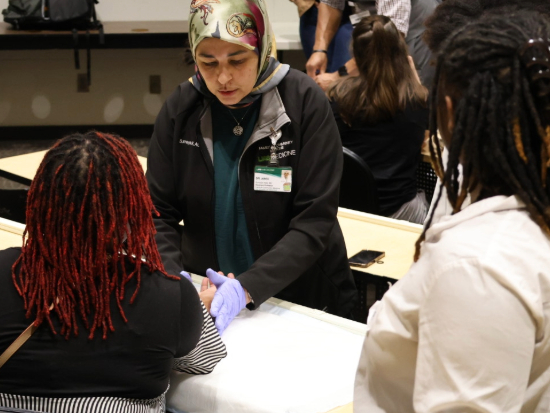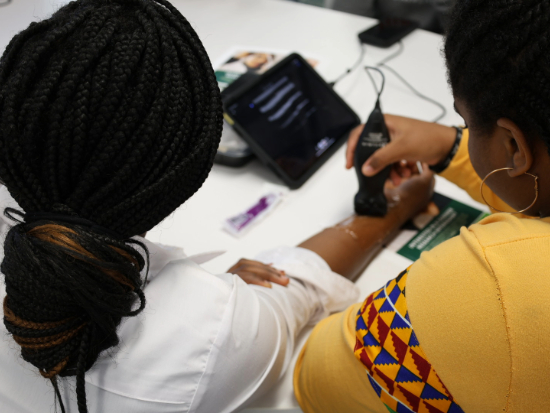
More than 55 students considering health care careers gathered in March for a full day of educational workshops and hands-on opportunities at the Integrative Healthcare Summit organized by the Student National Medical Association (SNMA).
First held in 2005, the Integrative Healthcare Summit brings together high school and college students, exposing these students to a broad spectrum of health care fields and professions, including primary care, optometry, pharmacy, occupational therapy, nursing, and public health. Alongside panel discussions, interactive workshops, and lectures on health careers, students also had the opportunity to learn about college admissions, medical school admissions, and goal-setting strategies.
“Exposure to health care careers at a young age is so important to encouraging underrepresented students to pursue medicine in the future,” explained SNMA member and UAB Heersink School of Medicine MS2 student Bria Gamble. “I loved talking to these younger students about what they can do and why it's important for them to look at medicine.”
The Department of Family and Community Medicine was well-represented as students from underrepresented backgrounds across Alabama explored educational opportunities at UAB.
Assistant professor Sameera Davuluri, M.D., covered primary care's vital role as the foundation for the health care system and issues caused by health disparities—especially in Alabama, where 34.7 percent of adults do not have health care. As part of this interactive session, students experienced a virtual primary care visit, discussed health disparities, and covered a typical day in the life of a family physician.
Students spent the afternoon rotating through hands-on workshops covering casting, point-of-care-ultrasound, suturing, and emergency responsiveness.
In one of the afternoon’s most popular sessions, Department of Family and Community Medicine assistant professors Sumayah Abed, M.D., Steven Brown, M.D., Health Hale, M.D., MPH, Calvin Spellmon, Jr., M.D., and family medicine resident Cristel Flores, M.D., guided students through the process of creating a cast on one of their peers.

Assistant professor Joseph Coppiano, M.D., was joined by sports and exercise medicine fellows Mark Carrasco, M.D., and Chris Grijalba, D.O., to cover point-of-care ultrasound (POCUS) and its usefulness in the field. Coppiano also serves as medical director for the Comprehensive Urban Underserved and Rural Experience Program, which works to increase the number and quality of students entering primary care, with an emphasis on students interested in caring for underserved populations. His experience working with undergrads served Coppiano well during the IHS, when students used part of the workshop to ask for tips on taking the MCAT, applying for med school, and deciding on a specialty.
“Everyone volunteering for the summit wanted to make the day as useful for these students as possible, whether that meant discussing POCUS devices or just talking to them about preparing for medical school,” said Coppiano. “We really approached our session as being the students’ time to use in whatever way worked best for them.”
An inspiring keynote from Spellmon capped off the summit. Spellmon, a pediatrician and sports medicine physician, currently serves as medical director for the Birmingham City Schools. He shared the story of his journey from a cramped Dallas apartment shared with 13 relatives and multiple failed attempts at the MCAT to assistant professor at UAB. Throughout the address, he challenged students to embrace hard things, break generational bad habits, and help restore trust in medicine.
Founded in 1964 as a student sector of the National Medical Association, the SNMA is dedicated to addressing the needs and concerns of minorities in medicine and in the community. The organization’s mission is to “increase the number of clinically excellent, culturally competent, and socially conscious physicians.”